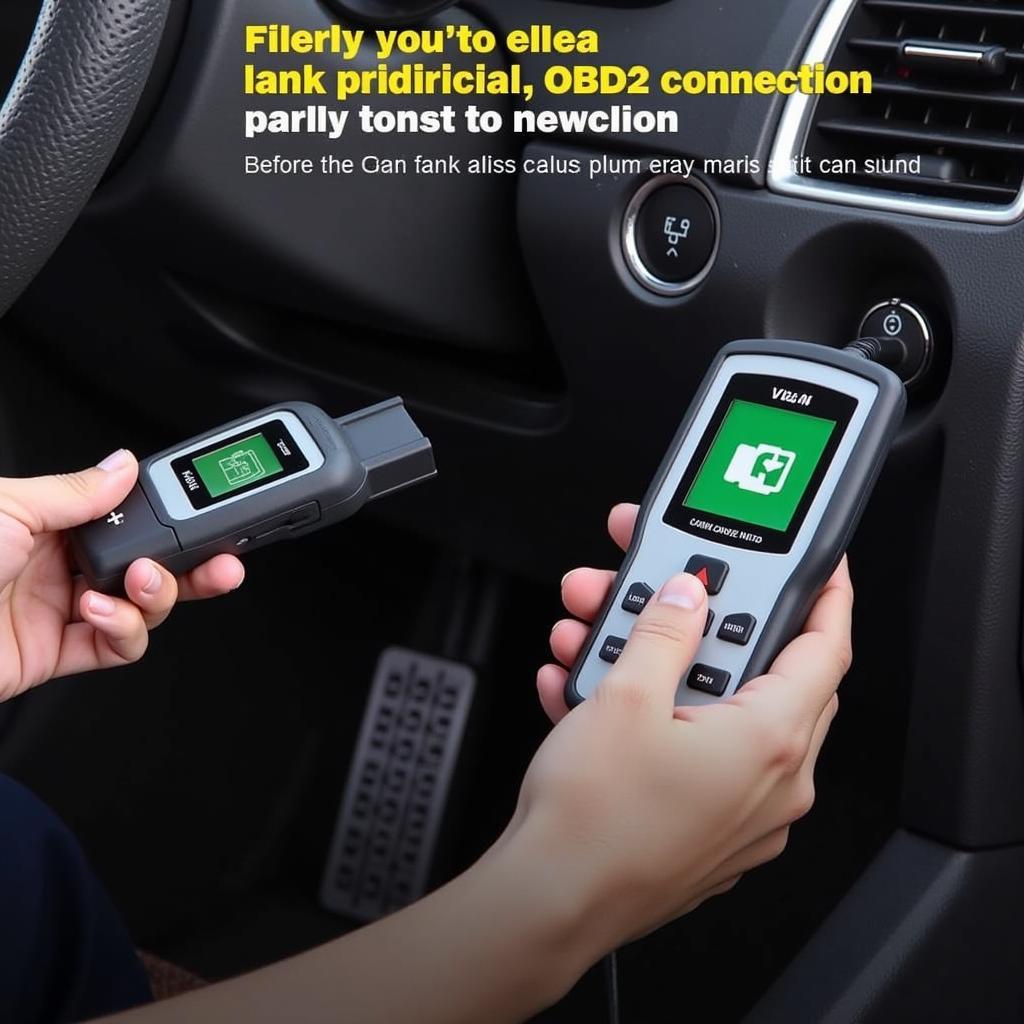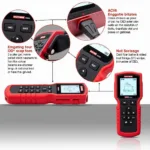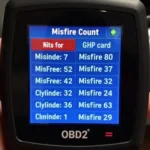If you’re experiencing slow OBD2 code reading times, you’re not alone. This common issue can be frustrating, especially when you’re trying to diagnose a car problem quickly. This article will delve into the possible reasons why your OBD2 scanner is lagging and provide practical solutions to help you get back on track.
Understanding OBD2 Scanners and Communication Speed
Before we dive into the causes, it’s helpful to understand how OBD2 scanners communicate with your car’s computer. The OBD2 system relies on a standardized communication protocol, allowing the scanner to request and receive data from the vehicle’s Electronic Control Unit (ECU). The speed of this data transfer can vary depending on several factors.
Common Causes of Slow OBD2 Scanner Reading Times
There are several potential culprits behind a sluggish OBD2 scanner:
- Poor Connection: A loose or corroded connection between the OBD2 port and the scanner can disrupt the data flow, resulting in slow reading times.
- Faulty OBD2 Scanner: Not all OBD2 scanners are created equal. A low-quality or malfunctioning scanner might have a slower processor or outdated software, contributing to the delay.
- Low Vehicle Battery: The OBD2 system relies on power from the car battery. If the battery is weak or failing, it can affect the scanner’s performance.
- Software Issues: Outdated scanner software or compatibility issues between the scanner and your vehicle’s software can also cause slowdowns.
- Complex Vehicle Systems: Modern cars have sophisticated computer systems with vast amounts of data. Retrieving and processing this information can take time, especially for older or less advanced scanners.
- CAN Bus Issues: The Controller Area Network (CAN bus) is a communication system within your vehicle. Problems with the CAN bus, such as wiring faults or interference, can impact data transmission speed.
Troubleshooting Slow OBD2 Scanner Reading Times
Here are some steps you can take to address slow OBD2 code reading:
- Check the Connection: Ensure the OBD2 scanner is securely connected to the vehicle’s OBD2 port. Inspect the connector for any damage or debris.
- Inspect the OBD2 Port: Examine the vehicle’s OBD2 port for bent pins, corrosion, or other damage. Clean the port with electrical contact cleaner if necessary.
- Test the Battery: Check the voltage of your car battery. A weak battery can affect the scanner’s performance. Consider charging or replacing the battery if needed.
- Update Scanner Software: Consult the manufacturer’s website for any available software updates for your OBD2 scanner. Updating the software can improve compatibility and performance.
- Try a Different OBD2 Scanner: If possible, test with a different OBD2 scanner to rule out a faulty device.
Expert Insights:
“Many people overlook the importance of a good connection and a healthy car battery,” says John Smith, an ASE certified master technician. “These simple checks can often resolve slow reading issues with OBD2 scanners.”
When to Seek Professional Help
If you’ve tried the troubleshooting steps above and are still experiencing slow OBD2 code reading, it might be time to consult a qualified mechanic. They have the expertise and specialized tools to diagnose more complex issues with your vehicle’s OBD2 system or CAN bus.
Conclusion
Dealing with an OBD2 scanner that reads codes slowly can be frustrating. By understanding the potential causes and following the troubleshooting steps outlined in this article, you can often resolve the issue yourself. However, if the problem persists, don’t hesitate to seek professional help from a qualified mechanic to ensure your vehicle is diagnosed and repaired correctly.
FAQs
1. Can a slow OBD2 scanner still provide accurate codes?
While a slow scanner can still retrieve codes, the delay might indicate an underlying issue with the scanner, connection, or the vehicle’s system. It’s always best to address the root cause of the slow performance.
2. How often should I update my OBD2 scanner software?
Checking for software updates every few months is good practice, especially if you’re experiencing issues or if you frequently work on newer car models.
3. Is it worth investing in a more expensive OBD2 scanner?
Higher-end scanners often offer faster processors, advanced features, and better software support, potentially leading to quicker reading times and a more seamless diagnostic experience. However, for basic code reading and troubleshooting, a reliable mid-range scanner can suffice.
4. Can extreme temperatures affect OBD2 scanner performance?
Extreme heat or cold can potentially affect the performance of electronic devices, including OBD2 scanners. If possible, try using the scanner within a moderate temperature range.
5. What are some common signs of a faulty OBD2 port?
Bent or damaged pins, corrosion, loose connections, and physical damage to the port itself are all indications of a potentially faulty OBD2 port.
Still Having Trouble? We Can Help!
For further assistance with your OBD2 scanner or any car diagnostic needs, our expert team is just a message away. Contact us via WhatsApp: +1(641)206-8880 or Email: [email protected]. We offer 24/7 customer support to keep you moving.
Don’t forget to check out our other informative articles on OBD2 scanners and car diagnostics on our website, including a helpful guide on obd2 scanner car throttle.


